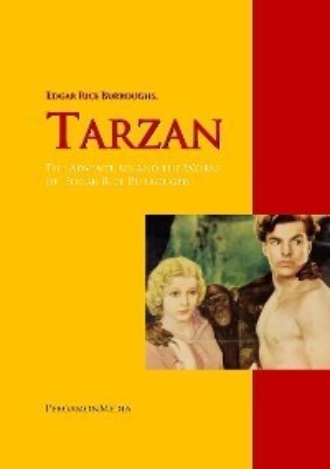
Полная версия
Tarzan: The Adventures and the Works of Edgar Rice Burroughs
The Swede's eyes opened wide, and a funny little sensation assailed the roots of his hairs. Also he turned almost white beneath his tan. Quite precipitately he left the cook's tent. He was not one who required a detailed exposition of intentions that were quite all too obvious.
As surely as though he had heard them plotting, he knew that Kai Shang and Momulla had come to take his life. The knowledge that he alone could navigate the Cowrie had, up to now, been sufficient assurance of his safety; but quite evidently something had occurred of which he had no knowledge that would make it quite worth the while of his co-conspirators to eliminate him.
Without a pause Gust darted across the beach and into the jungle. He was afraid of the jungle; uncanny noises that were indeed frightful came forth from its recesses—the tangled mazes of the mysterious country back of the beach.
But if Gust was afraid of the jungle he was far more afraid of Kai Shang and Momulla. The dangers of the jungle were more or less problematical, while the danger that menaced him at the hands of his companions was a perfectly well-known quantity, which might be expressed in terms of a few inches of cold steel, or the coil of a light rope. He had seen Kai Shang garrotte a man at Pai-sha in a dark alleyway back of Loo Kotai's place. He feared the rope, therefore, more than he did the knife of the Maori; but he feared them both too much to remain within reach of either. Therefore he chose the pitiless jungle.
Chapter 21
The Law of the Jungle
In Tarzan's camp, by dint of threats and promised rewards, the ape-man had finally succeeded in getting the hull of a large skiff almost completed. Much of the work he and Mugambi had done with their own hands in addition to furnishing the camp with meat.
Schneider, the mate, had been doing considerable grumbling, and had at last openly deserted the work and gone off into the jungle with Schmidt to hunt. He said that he wanted a rest, and Tarzan, rather than add to the unpleasantness which already made camp life almost unendurable, had permitted the two men to depart without a remonstrance.
Upon the following day, however, Schneider affected a feeling of remorse for his action, and set to work with a will upon the skiff. Schmidt also worked good-naturedly, and Lord Greystoke congratulated himself that at last the men had awakened to the necessity for the labour which was being asked of them and to their obligations to the balance of the party.
It was with a feeling of greater relief than he had experienced for many a day that he set out that noon to hunt deep in the jungle for a herd of small deer which Schneider reported that he and Schmidt had seen there the day before.
The direction in which Schneider had reported seeing the deer was toward the south-west, and to that point the ape-man swung easily through the tangled verdure of the forest.
And as he went there approached from the north a half-dozen ill-featured men who went stealthily through the jungle as go men bent upon the commission of a wicked act.
They thought that they travelled unseen; but behind them, almost from the moment they quitted their own camp, a tall man crept upon their trail. In the man's eyes were hate and fear, and a great curiosity. Why went Kai Shang and Momulla and the others thus stealthily toward the south? What did they expect to find there? Gust shook his low-browed head in perplexity. But he would know. He would follow them and learn their plans, and then if he could thwart them he would—that went without question.
At first he had thought that they searched for him; but finally his better judgment assured him that such could not be the case, since they had accomplished all they really desired by chasing him out of camp. Never would Kai Shang or Momulla go to such pains to slay him or another unless it would put money into their pockets, and as Gust had no money it was evident that they were searching for someone else.
Presently the party he trailed came to a halt. Its members concealed themselves in the foliage bordering the game trail along which they had come. Gust, that he might the better observe, clambered into the branches of a tree to the rear of them, being careful that the leafy fronds hid him from the view of his erstwhile mates.
He had not long to wait before he saw a strange white man approach carefully along the trail from the south.
At sight of the new-comer Momulla and Kai Shang arose from their places of concealment and greeted him. Gust could not overhear what passed between them. Then the man returned in the direction from which he had come.
He was Schneider. Nearing his camp he circled to the opposite side of it, and presently came running in breathlessly. Excitedly he hastened to Mugambi.
"Quick!" he cried. "Those apes of yours have caught Schmidt and will kill him if we do not hasten to his aid. You alone can call them off. Take Jones and Sullivan—you may need help—and get to him as quick as you can. Follow the game trail south for about a mile. I will remain here. I am too spent with running to go back with you," and the mate of the Kincaid threw himself upon the ground, panting as though he was almost done for.
Mugambi hesitated. He had been left to guard the two women. He did not know what to do, and then Jane Clayton, who had heard Schneider's story, added her pleas to those of the mate.
"Do not delay," she urged. "We shall be all right here. Mr. Schneider will remain with us. Go, Mugambi. The poor fellow must be saved."
Schmidt, who lay hidden in a bush at the edge of the camp, grinned. Mugambi, heeding the commands of his mistress, though still doubtful of the wisdom of his action, started off toward the south, with Jones and Sullivan at his heels.
No sooner had he disappeared than Schmidt rose and darted north into the jungle, and a few minutes later the face of Kai Shang of Fachan appeared at the edge of the clearing. Schneider saw the Chinaman, and motioned to him that the coast was clear.
Jane Clayton and the Mosula woman were sitting at the opening of the former's tent, their backs toward the approaching ruffians. The first intimation that either had of the presence of strangers in camp was the sudden appearance of a half-dozen ragged villains about them.
"Come!" said Kai Shang, motioning that the two arise and follow him.
Jane Clayton sprang to her feet and looked about for Schneider, only to see him standing behind the newcomers, a grin upon his face. At his side stood Schmidt. Instantly she saw that she had been made the victim of a plot.
"What is the meaning of this?" she asked, addressing the mate.
"It means that we have found a ship and that we can now escape from Jungle Island," replied the man.
"Why did you send Mugambi and the others into the jungle?" she inquired.
"They are not coming with us—only you and I, and the Mosula woman."
"Come!" repeated Kai Shang, and seized Jane Clayton's wrist.
One of the Maoris grasped the black woman by the arm, and when she would have screamed struck her across the mouth.
Mugambi raced through the jungle toward the south. Jones and Sullivan trailed far behind. For a mile he continued upon his way to the relief of Schmidt, but no signs saw he of the missing man or of any of the apes of Akut.
At last he halted and called aloud the summons which he and Tarzan had used to hail the great anthropoids. There was no response. Jones and Sullivan came up with the black warrior as the latter stood voicing his weird call. For another half-mile the black searched, calling occasionally.
Finally the truth flashed upon him, and then, like a frightened deer, he wheeled and dashed back toward camp. Arriving there, it was but a moment before full confirmation of his fears was impressed upon him. Lady Greystoke and the Mosula woman were gone. So, likewise, was Schneider.
When Jones and Sullivan joined Mugambi he would have killed them in his anger, thinking them parties to the plot; but they finally succeeded in partially convincing him that they had known nothing of it.
As they stood speculating upon the probable whereabouts of the women and their abductor, and the purpose which Schneider had in mind in taking them from camp, Tarzan of the Apes swung from the branches of a tree and crossed the clearing toward them.
His keen eyes detected at once that something was radically wrong, and when he had heard Mugambi's story his jaws clicked angrily together as he knitted his brows in thought.
What could the mate hope to accomplish by taking Jane Clayton from a camp upon a small island from which there was no escape from the vengeance of Tarzan? The ape-man could not believe the fellow such a fool, and then a slight realization of the truth dawned upon him.
Schneider would not have committed such an act unless he had been reasonably sure that there was a way by which he could quit Jungle Island with his prisoners. But why had he taken the black woman as well? There must have been others, one of whom wanted the dusky female.
"Come," said Tarzan, "there is but one thing to do now, and that is to follow the trail."
As he finished speaking a tall, ungainly figure emerged from the jungle north of the camp. He came straight toward the four men. He was an entire stranger to all of them, not one of whom had dreamed that another human being than those of their own camp dwelt upon the unfriendly shores of Jungle Island.
It was Gust. He came directly to the point.
"Your women were stolen," he said. "If you want ever to see them again, come quickly and follow me. If we do not hurry the Cowrie will be standing out to sea by the time we reach her anchorage."
"Who are you?" asked Tarzan. "What do you know of the theft of my wife and the black woman?"
"I heard Kai Shang and Momulla the Maori plot with two men of your camp. They had chased me from our camp, and would have killed me. Now I will get even with them. Come!"
Gust led the four men of the Kincaid's camp at a rapid trot through the jungle toward the north. Would they come to the sea in time? But a few more minutes would answer the question.
And when at last the little party did break through the last of the screening foliage, and the harbour and the ocean lay before them, they realized that fate had been most cruelly unkind, for the Cowrie was already under sail and moving slowly out of the mouth of the harbour into the open sea.
What were they to do? Tarzan's broad chest rose and fell to the force of his pent emotions. The last blow seemed to have fallen, and if ever in all his life Tarzan of the Apes had had occasion to abandon hope it was now that he saw the ship bearing his wife to some frightful fate moving gracefully over the rippling water, so very near and yet so hideously far away.
In silence he stood watching the vessel. He saw it turn toward the east and finally disappear around a headland on its way he knew not whither. Then he dropped upon his haunches and buried his face in his hands.
It was after dark that the five men returned to the camp on the east shore. The night was hot and sultry. No slightest breeze ruffled the foliage of the trees or rippled the mirror-like surface of the ocean. Only a gentle swell rolled softly in upon the beach.
Never had Tarzan seen the great Atlantic so ominously at peace. He was standing at the edge of the beach gazing out to sea in the direction of the mainland, his mind filled with sorrow and hopelessness, when from the jungle close behind the camp came the uncanny wail of a panther.
There was a familiar note in the weird cry, and almost mechanically Tarzan turned his head and answered. A moment later the tawny figure of Sheeta slunk out into the half-light of the beach. There was no moon, but the sky was brilliant with stars. Silently the savage brute came to the side of the man. It had been long since Tarzan had seen his old fighting companion, but the soft purr was sufficient to assure him that the animal still recalled the bonds which had united them in the past.
The ape-man let his fingers fall upon the beast's coat, and as Sheeta pressed close against his leg he caressed and fondled the wicked head while his eyes continued to search the blackness of the waters.
Presently he started. What was that? He strained his eyes into the night. Then he turned and called aloud to the men smoking upon their blankets in the camp. They came running to his side; but Gust hesitated when he saw the nature of Tarzan's companion.
"Look!" cried Tarzan. "A light! A ship's light! It must be the Cowrie. They are becalmed." And then with an exclamation of renewed hope, "We can reach them! The skiff will carry us easily."
Gust demurred. "They are well armed," he warned. "We could not take the ship—just five of us."
"There are six now," replied Tarzan, pointing to Sheeta, "and we can have more still in a half-hour. Sheeta is the equivalent of twenty men, and the few others I can bring will add full a hundred to our fighting strength. You do not know them."
The ape-man turned and raised his head toward the jungle, while there pealed from his lips, time after time, the fearsome cry of the bull-ape who would summon his fellows.
Presently from the jungle came an answering cry, and then another and another. Gust shuddered. Among what sort of creatures had fate thrown him? Were not Kai Shang and Momulla to be preferred to this great white giant who stroked a panther and called to the beasts of the jungle?
In a few minutes the apes of Akut came crashing through the underbrush and out upon the beach, while in the meantime the five men had been struggling with the unwieldy bulk of the skiff's hull.
By dint of Herculean efforts they had managed to get it to the water's edge. The oars from the two small boats of the Kincaid, which had been washed away by an off-shore wind the very night that the party had landed, had been in use to support the canvas of the sailcloth tents. These were hastily requisitioned, and by the time Akut and his followers came down to the water all was ready for embarkation.
Once again the hideous crew entered the service of their master, and without question took up their places in the skiff. The four men, for Gust could not be prevailed upon to accompany the party, fell to the oars, using them paddle-wise, while some of the apes followed their example, and presently the ungainly skiff was moving quietly out to sea in the direction of the light which rose and fell gently with the swell.
A sleepy sailor kept a poor vigil upon the Cowrie's deck, while in the cabin below Schneider paced up and down arguing with Jane Clayton. The woman had found a revolver in a table drawer in the room in which she had been locked, and now she kept the mate of the Kincaid at bay with the weapon.
The Mosula woman kneeled behind her, while Schneider paced up and down before the door, threatening and pleading and promising, but all to no avail. Presently from the deck above came a shout of warning and a shot. For an instant Jane Clayton relaxed her vigilance, and turned her eyes toward the cabin skylight. Simultaneously Schneider was upon her.
The first intimation the watch had that there was another craft within a thousand miles of the Cowrie came when he saw the head and shoulders of a man poked over the ship's side. Instantly the fellow sprang to his feet with a cry and levelled his revolver at the intruder. It was his cry and the subsequent report of the revolver which threw Jane Clayton off her guard.
Upon deck the quiet of fancied security soon gave place to the wildest pandemonium. The crew of the Cowrie rushed above armed with revolvers, cutlasses, and the long knives that many of them habitually wore; but the alarm had come too late. Already the beasts of Tarzan were upon the ship's deck, with Tarzan and the two men of the Kincaid's crew.
In the face of the frightful beasts the courage of the mutineers wavered and broke. Those with revolvers fired a few scattering shots and then raced for some place of supposed safety. Into the shrouds went some; but the apes of Akut were more at home there than they.
Screaming with terror the Maoris were dragged from their lofty perches. The beasts, uncontrolled by Tarzan who had gone in search of Jane, loosed the full fury of their savage natures upon the unhappy wretches who fell into their clutches.
Sheeta, in the meanwhile, had felt his great fangs sink into but a single jugular. For a moment he mauled the corpse, and then he spied Kai Shang darting down the companionway toward his cabin.
With a shrill scream Sheeta was after him—a scream which awoke an almost equally uncanny cry in the throat of the terror-stricken Chinaman.
But Kai Shang reached his cabin a fraction of a second ahead of the panther, and leaping within slammed the door—just too late. Sheeta's great body hurtled against it before the catch engaged, and a moment later Kai Shang was gibbering and shrieking in the back of an upper berth.
Lightly Sheeta sprang after his victim, and presently the wicked days of Kai Shang of Fachan were ended, and Sheeta was gorging himself upon tough and stringy flesh.
A moment scarcely had elapsed after Schneider leaped upon Jane Clayton and wrenched the revolver from her hand, when the door of the cabin opened and a tall and half-naked white man stood framed within the portal.
Silently he leaped across the cabin. Schneider felt sinewy fingers at his throat. He turned his head to see who had attacked him, and his eyes went wide when he saw the face of the ape-man close above his own.
Grimly the fingers tightened upon the mate's throat. He tried to scream, to plead, but no sound came forth. His eyes protruded as he struggled for freedom, for breath, for life.
Jane Clayton seized her husband's hands and tried to drag them from the throat of the dying man; but Tarzan only shook his head.
"Not again," he said quietly. "Before have I permitted scoundrels to live, only to suffer and to have you suffer for my mercy. This time we shall make sure of one scoundrel—sure that he will never again harm us or another," and with a sudden wrench he twisted the neck of the perfidious mate until there was a sharp crack, and the man's body lay limp and motionless in the ape-man's grasp. With a gesture of disgust Tarzan tossed the corpse aside. Then he returned to the deck, followed by Jane and the Mosula woman.
The battle there was over. Schmidt and Momulla and two others alone remained alive of all the company of the Cowrie, for they had found sanctuary in the forecastle. The others had died, horribly, and as they deserved, beneath the fangs and talons of the beasts of Tarzan, and in the morning the sun rose on a grisly sight upon the deck of the unhappy Cowrie; but this time the blood which stained her white planking was the blood of the guilty and not of the innocent.
Tarzan brought forth the men who had hidden in the forecastle, and without promises of immunity from punishment forced them to help work the vessel—the only alternative was immediate death.
A stiff breeze had risen with the sun, and with canvas spread the Cowrie set in toward Jungle Island, where a few hours later, Tarzan picked up Gust and bid farewell to Sheeta and the apes of Akut, for here he set the beasts ashore to pursue the wild and natural life they loved so well; nor did they lose a moment's time in disappearing into the cool depths of their beloved jungle.
That they knew that Tarzan was to leave them may be doubted—except possibly in the case of the more intelligent Akut, who alone of all the others remained upon the beach as the small boat drew away toward the schooner, carrying his savage lord and master from him.
And as long as their eyes could span the distance, Jane and Tarzan, standing upon the deck, saw the lonely figure of the shaggy anthropoid motionless upon the surf-beaten sands of Jungle Island.
It was three days later that the Cowrie fell in with H.M. sloop-of-war Shorewater, through whose wireless Lord Greystoke soon got in communication with London. Thus he learned that which filled his and his wife's heart with joy and thanksgiving—little Jack was safe at Lord Greystoke's town house.
It was not until they reached London that they learned the details of the remarkable chain of circumstances that had preserved the infant unharmed.
It developed that Rokoff, fearing to take the child aboard the Kincaid by day, had hidden it in a low den where nameless infants were harboured, intending to carry it to the steamer after dark.
His confederate and chief lieutenant, Paulvitch, true to the long years of teaching of his wily master, had at last succumbed to the treachery and greed that had always marked his superior, and, lured by the thoughts of the immense ransom that he might win by returning the child unharmed, had divulged the secret of its parentage to the woman who maintained the foundling asylum. Through her he had arranged for the substitution of another infant, knowing full well that never until it was too late would Rokoff suspect the trick that had been played upon him.
The woman had promised to keep the child until Paulvitch returned to England; but she, in turn, had been tempted to betray her trust by the lure of gold, and so had opened negotiations with Lord Greystoke's solicitors for the return of the child.
Esmeralda, the old Negro nurse whose absence on a vacation in America at the time of the abduction of little Jack had been attributed by her as the cause of the calamity, had returned and positively identified the infant.
The ransom had been paid, and within ten days of the date of his kidnapping the future Lord Greystoke, none the worse for his experience, had been returned to his father's home.
And so that last and greatest of Nikolas Rokoff's many rascalities had not only miserably miscarried through the treachery he had taught his only friend, but it had resulted in the arch-villain's death, and given to Lord and Lady Greystoke a peace of mind that neither could ever have felt so long as the vital spark remained in the body of the Russian and his malign mind was free to formulate new atrocities against them.
Rokoff was dead, and while the fate of Paulvitch was unknown, they had every reason to believe that he had succumbed to the dangers of the jungle where last they had seen him—the malicious tool of his master.
And thus, in so far as they might know, they were to be freed for ever from the menace of these two men—the only enemies which Tarzan of the Apes ever had had occasion to fear, because they struck at him cowardly blows, through those he loved.
It was a happy family party that were reunited in Greystoke House the day that Lord Greystoke and his lady landed upon English soil from the deck of the Shorewater.
Accompanying them were Mugambi and the Mosula woman whom he had found in the bottom of the canoe that night upon the bank of the little tributary of the Ugambi.
The woman had preferred to cling to her new lord and master rather than return to the marriage she had tried to escape.
Tarzan had proposed to them that they might find a home upon his vast African estates in the land of the Waziri, where they were to be sent as soon as opportunity presented itself.
Possibly we shall see them all there amid the savage romance of the grim jungle and the great plains where Tarzan of the Apes loves best to be.
Who knows?
The Son Of Tarzan
Chapter 1
The long boat of the Marjorie W. was floating down the broad Ugambi with ebb tide and current. Her crew were lazily enjoying this respite from the arduous labor of rowing up stream. Three miles below them lay the Marjorie W. herself, quite ready to sail so soon as they should have clambered aboard and swung the long boat to its davits. Presently the attention of every man was drawn from his dreaming or his gossiping to the northern bank of the river. There, screaming at them in a cracked falsetto and with skinny arms outstretched, stood a strange apparition of a man.
"Wot the 'ell?" ejaculated one of the crew.
"A white man!" muttered the mate, and then: "Man the oars, boys, and we'll just pull over an' see what he wants."
When they came close to the shore they saw an emaciated creature with scant white locks tangled and matted. The thin, bent body was naked but for a loin cloth. Tears were rolling down the sunken pock-marked cheeks. The man jabbered at them in a strange tongue.






